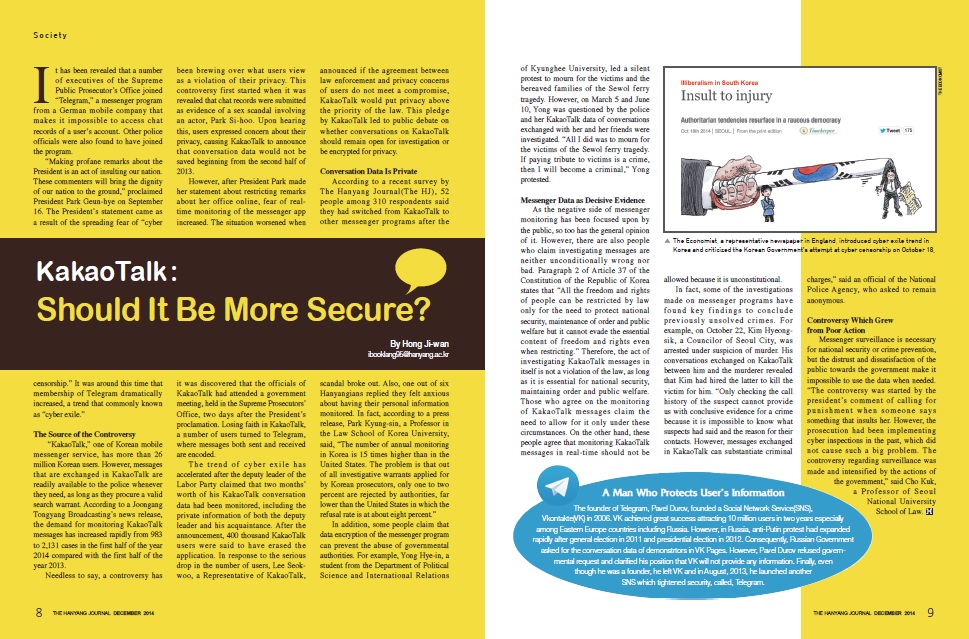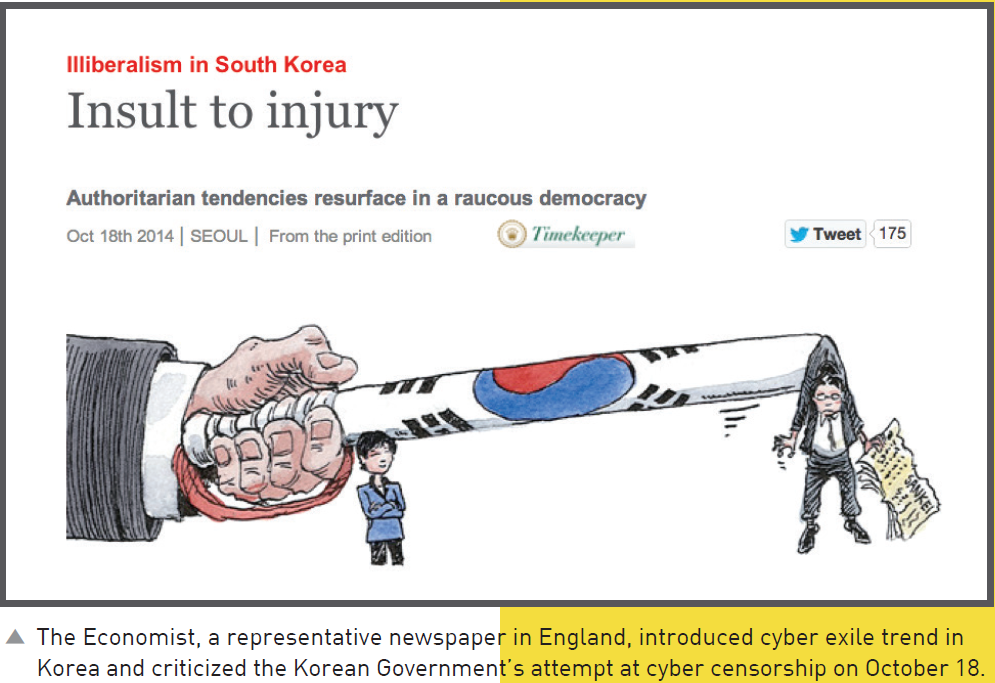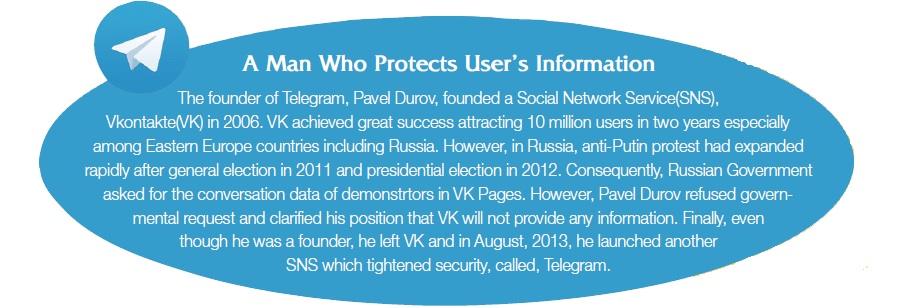

It has been revealed that a number of executives of the Supreme Public Prosecutor’s Office joined “Telegram,” a messenger program from a German mobile company that makes it impossible to access chat records of a userʼs account. Other police officials were also found to have joined the program.
“Making profane remarks about the President is an act of insulting our nation. These commenters will bring the dignity of our nation to the ground,” proclaimed President Park Geun-hye on September 16. The President’s statement came as a result of the spreading fear of “cyber censorship.” It was around this time that membership of Telegram dramatically increased, a trend that commonly known as “cyber exile.”
The Source of the Controversy
“KakaoTalk,” one of Korean mobile messenger service, has more than 26 million Korean users. However, messages that are exchanged in KakaoTalk are readily available to the police whenever they need, as long as they procure a valid search warrant. According to a Joongang Tongyang Broadcasting’s news release, the demand for monitoring KakaoTalk messages has increased rapidly from 983 to 2,131 cases in the first half of the year 2014 compared with the first half of the year 2013.
Needless to say, a controversy has been brewing over what users view as a violation of their privacy. This controversy first started when it was revealed that chat records were submitted as evidence of a sex scandal involving an actor, Park Si-hoo. Upon hearing this, users expressed concern about their privacy, causing KakaoTalk to announce that conversation data would not be saved beginning from the second half of 2013.
However, after President Park made her statement about restricting remarks about her office online, fear of real-time monitoring of the messenger app increased. The situation worsened when it was discovered that the officials of KakaoTalk had attended a government meeting, held in the Supreme Prosecutors’ Office, two days after the President’s proclamation. Losing faith in KakaoTalk, a number of users turned to Telegram, where messages both sent and received are encoded.
The trend of cyber exile has accelerated after the deputy leader of the Labor Party claimed that two months’ worth of his KakaoTalk conversation data had been monitored, including the private information of both the deputy leader and his acquaintance. After the announcement, 400 thousand KakaoTalk users were said to have erased the application. In response to the serious drop in the number of users, Lee Seok-woo, a Representative of KakaoTalk, announced if the agreement between law enforcement and privacy concerns of users do not meet a compromise, KakaoTalk would put privacy above the priority of the law. This pledge by KakaoTalk led to public debate on whether conversations on KakaoTalk should remain open for investigation or be encrypted for privacy.
Conversation Data Is Private
According to a recent survey by The Hanyang Journal(The HJ), 52 people among 310 respondents said they had switched from KakaoTalk to other messenger programs after the scandal broke out. Also, one out of six Hanyangians replied they felt anxious about having their personal information monitored. In fact, according to a press release, Park Kyung-sin, a Professor in the Law School of Korea University, said, “The number of annual monitoring in Korea is 15 times higher than in the United States. The problem is that out of all investigative warrants applied for by Korean prosecutors, only one to two percent are rejected by authorities, far lower than the United States in which the refusal rate is at about eight percent.”
In addition, some people claim that data encryption of the messenger program can prevent the abuse of governmental authorities. For example, Yong Hye-in, a student from the Department of Political Science and International Relations of Kyunghee University, led a silent protest to mourn for the victims and the bereaved families of the Sewol ferry tragedy. However, on March 5 and June 10, Yong was questioned by the police and her KakaoTalk data of conversations exchanged with her and her friends were investigated. “All I did was to mourn for the victims of the Sewol ferry tragedy. If paying tribute to victims is a crime, then I will become a criminal,” Yong protested.
Messenger Data as Decisive Evidence
As the negative side of messenger monitoring has been focused upon by the public, so too has the general opinion of it. However, there are also people who claim investigating messages are neither unconditionally wrong nor bad. Paragraph 2 of Article 37 of the Constitution of the Republic of Korea states that “All the freedom and rights of people can be restricted by law only for the need to protect national security, maintenance of order and public welfare but it cannot evade the essential content of freedom and rights even when restricting.” Therefore, the act of investigating KakaoTalk messages in itself is not a violation of the law, as long as it is essential for national security, maintaining order and public welfare. Those who agree on the monitoring of KakaoTalk messages claim the need to allow for it only under these circumstances. On the other hand, these people agree that monitoring KakaoTalk messages in real-time should not be allowed because it is unconstitutional.
In fact, some of the investigations made on messenger programs have found key findings to conclude previously unsolved crimes. For example, on October 22, Kim Hyeong-sik, a Councilor of Seoul City, was arrested under suspicion of murder. His conversations exchanged on KakaoTalk between him and the murderer revealed that Kim had hired the latter to kill the victim for him. “Only checking the call history of the suspect cannot provide us with conclusive evidence for a crime because it is impossible to know what suspects had said and the reason for their contacts. However, messages exchanged in KakaoTalk can substantiate criminal charges,” said an official of the National Police Agency, who asked to remain anonymous.
Controversy Which Grew from Poor Action
Messenger surveillance is necessary for national security or crime prevention, but the distrust and dissatisfaction of the public towards the government make it impossible to use the data when needed. “The controversy was started by the president’s comment of calling for punishment when someone says something that insults her. However, the prosecution had been implementing cyber inspections in the past, which did not cause such a big problem. The controversy regarding surveillance was made and intensified by the actions of the government,” said Cho Kuk, a Professor of Seoul National University School of Law.


